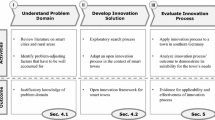Abstract
The paper discusses the concept of “urban smartness” starting from the early results of the Periphèria Project. Periphèria is a 30-month pilot B action funded by the European Commission under the CIP ICT PSP Programme and it aims at deploying convergent Future Internet platforms and services for the promotion of sustainable lifestyles in and across emergent networks of “smart” peripheral cities in Europe. Periphèria develops the Living Lab premise of shifting technology R&D out of the laboratory and into the real world in a systemic blend of technological with social innovation. It defines five archetypical “Arenas”—specific urban settings or innovation playgrounds, with defined social features and infrastructure requirements—as the spaces where co-design and service integration processes unfold. The paper is divided into three parts. In the first part, the authors review the concept of urban smartness as it is recently discussed in the literature. In the second part, they present the early results of the Periphèria project paying attention to the city smartness, urban smartness, and perspectives. Finally, in the third part, the spatial dimension of urban smartness is explored.


Similar content being viewed by others
References
Acatec (2011) Smart Cities. German high technology for the cities of the future. Tasks and opportunities. Acatech bezieht Position, Nr. 7, Heidelberg inter alia. Springer, Heidelberg
Amin A, Thrift N (2002) Cities: reimagining the urban. Polity Press, Cambridge
Barro RJ (1993) Macroeconomics. Wiley, New York
Brighenti AM (2010) On territorology. Towards a general science of territory. Theory Cult Soc 27(1):67
Caragliu A, Del Bo C, Nijkamp P (2009) Smart cities in Europe. http://dare.ubvu.vu.nl/bitstream/ 1871/15296/2/20090048.pdf. Accessed September 2011
Carruthers JI (2008) Does ‘smart growth’ matter to public finance? Urban Stud 45(9):1791–1823
Celino A, Concilio G (2010) Participation in environmental spatial planning: structuring-scenario to manage knowledge in action. Futures 42(7):733–742
Concilio G, De Bonis L, Trapani F (2011) The territorial dimension of living lab approaches: starting the European “participant observatory”. In: Cunningham PM (eds). eChallenges e-2011 Conference Proceedings, IIMC International Information Management Corporation, 2011
De Bonis L (2006) Oltre la “non partecipazione”. In: Trapani F (ed) Urbacost. Un progetto pilota per la Sicilia centrale. Urbanizzazione costiera, centri storici e arene decisionali: ipotesi a confronto. Franco Angeli, Milano, pp 271–282
ESDP Expert Document “Managing the Territorial Dimension of EU Policies after Enlargement” (2003) [http://ec.europa.eu/regional_policy/debate/document/futur/member/esdp.pdf]
Faludi A (2009) A turning point in the development of European spatial planning? The ‘Territorial Agenda of the European Union’ and the ‘First Action Programme’. Prog in Plan 71:1–42
Gibbson W (2011) Life in the meta city. Scientific American, September, 88–89
Glaeser E (2011) Engines of innovation. Scientific American, September, 50–55
Holland RG (2008) Will the real smart city please stand up? City 12(3):303–320
Ishida T, Isbister K (eds) (2000) Digital cities: technologies, experiences, and future perspectives. Springer, Heidelberg
Jakob D (2011) Constructing the creative neighborhood: hopes and limitations of creative city policies in Berlin. City Cult Soc 1:193–198
Komminos N (2002) Intelligent cities: innovation, knowledge systems and digital spaces. Spon, London
Komminos N (2008) Intelligent cities and globalisation of innovation networks. Routledge, London
Komninos N, Schaffers H, Pallot M (2011) Developing a policy roadmap for smart cities and the future internet. In: Cunningham PM (eds). eChallenges e-2011 Conference Proceedings, IIMC International Information Management Corporation, 2011
Lévy P (1994) L’intelligence collective. Pour une anthropologie du cyberespace. La Découverte, Paris
Macdonald KI (2000) Use and valuation: information in the city. Urban Stud 37(10):1881–1892
Marsh J (2008) Living labs and territorial innovation. In: Cunningham PM (ed) Collaboration and the knowledge economy: issues, applications, case studies. IOS Press, Amsterdam
May G (1976) The future is ours. Greenwood, Westport
Olson M (1965) The logic of collective action: public goods and the theory of groups. Harvard University Press, Cambridge
Ostrom E (1990) Governing the commons: the evolution of institutions for collective actions. Cambridge University Press, Cambridge
Pallot M, Trousse B, Senach B, Schaffers H, Komninos N (2011) Future internet and living lab research domain landscapes: filling the gap between technology push and application pull in the context of smart cities. In: Cunningham PM (Eds). eChallenges e-2011 Conference Proceedings, IIMC International Information Management Corporation, 2011
Paskaleva KA (2009) Enabling the smart city: the progress of city e-governance in Europe. Int J of Innov and Reg Dev 1(4):405–422
Periphèria (2011) Deliverable 2.1. Arena models 1, Periphèria Project [www.periphria.eu]
Ratti C, Townsend A (2011) The social nexus. Scientific American, September, 42–49
Smart Cities (2007) Smart cities: ranking of European medium-sized cities. Final report. [http://www.smart-cities.eu/download/smart_cities_final_report.pdf]
Stoker G (2008) The microfoundations of governance: why psychology rather than economics could be the key to better intergovernmental relations. Paper presented at Zhejiang University. http://www.soton.ac.uk/ccd/people/stokerg.html. Accessed June 2008
Wesley SJ (2007) Smart growth as urban reform: a pragmatic ‘recoding’ of the new regionalism. Urban Stud 44(1):15–35
European Commission (2009) Ageing report: economic and budgetary projections for the EU-27 member states (2008–2060). European Commission, Directorate General Economic and Financial Affairs, Brussels.
World Health Organization (2008) The world health report 2008. Primary health care - now more than ever. World Health Organization, Geneva.
Author information
Authors and Affiliations
Corresponding author
Additional information
This article reflects on the early results of the European Periphèria Projects [CIP ICT PSP Programme (Periphèria Project: grant agreement number 271015)] and mainly refers to the contents of Deliverable D.2.1 Arena Models whose authors, together with Concilio G. are: Francesca Rizzo, Per-Anders Hillgren, Per Linde, and Bo Peterson (MEDEA/Malmö university); Marina Cugurra, Giorgio Da Bormida, Alessandra Risso (Comune di Genova); Jens Eschenbaecher, Stefan Wellsandt (Bremer Institut für Produktion und Logistik GmbH (BIBA), Bremen); Maria Cristina De Araújo Torres Daniel, António Pombinho (Município Palmela); and Ira Giannakoudaki, and Dimitra Tsakanika (DAEM S.A., Athens).
Rights and permissions
About this article
Cite this article
Concilio, G., De Bonis, L., Marsh, J. et al. Urban Smartness: Perspectives Arising in the Periphéria Project. J Knowl Econ 4, 205–216 (2013). https://doi.org/10.1007/s13132-012-0088-5
Received:
Accepted:
Published:
Issue Date:
DOI: https://doi.org/10.1007/s13132-012-0088-5






